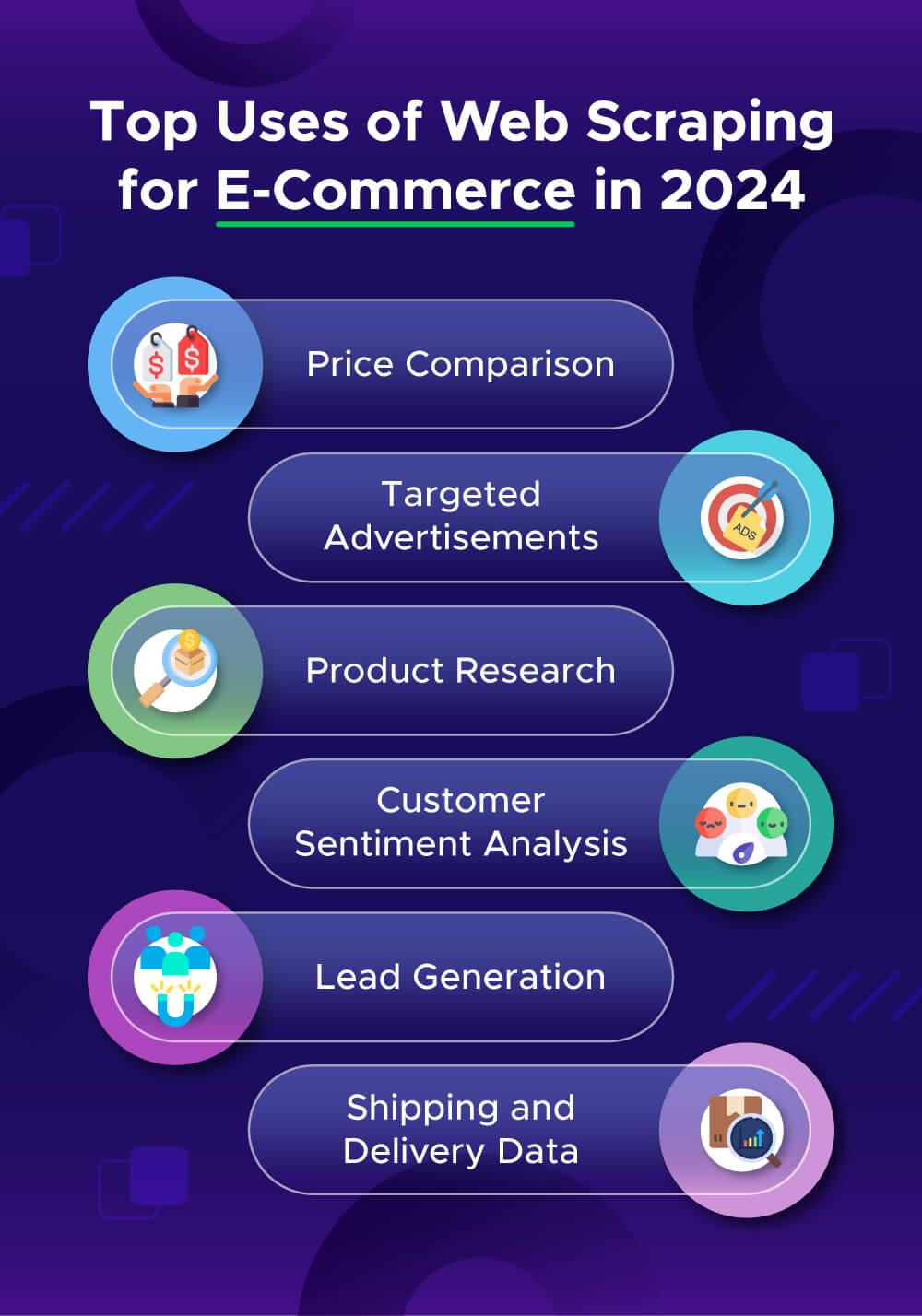eCommerce is a fast-paced industry that has undoubtedly grown post-COVID era. More companies are moving to do business online, increasing their revenue growth. Manufacturers have embraced the direct-to-consumer approach to sell their products, eliminating hassles. Small businesses have also caught on with the trend of dispatching their products directly to customers.
Being a consumer-centric field, merchants look for ways to improve customer experience. This can be made possible by gaining insights from various data sources. eCommerce web scraping enables businesses to get accurate information on product prices, customer reviews, and competitor analysis.
This blog will discuss the web scraping trends that can help you get the best data for eCommerce success.
Why Web Scraping is Important for eCommerce
Web scraping is an important tool for companies looking to grow and stay ahead. The eCommerce industry is competitive with a lot of sub-sectors that are already saturated. Customers are presented with many deals daily, giving them the power to choose which product works best for them
Gathering important eCommerce data from numerous sites could be the major difference. This process involves extracting information from eCommerce sites, which can be pivotal in preparing and anticipating the next big thing in the market.
Python is an important language for eCommerce data scraping and you can opt for a comprehensive tool to manage large-scale web scraping activities. You can use Python libraries like BeautifulSoup, Requests, Selenium, Scrapy, and Ixml.
In addition, popular eCommerce websites like Amazon, eBay, and Shopify have their respective API that can used to pull data from their pages.
However, some websites include CAPTCHAs and other prevention measures to reduce bot-like activities.
Here are some other things to consider:
- Constantly abide by use guidelines and robots.txt files on websites. Steer clear of flooding servers with too many requests.
- When gathering personal data, be mindful of data protection laws like GDPR. Ensuring Secure Data Extraction: Security is paramount when scraping eCommerce sites. Implementing SSL certificates ensures that the data exchanged during scraping remains encrypted and secure. This is not only protects the integrity of your operations but also ensures compliance with data protection regulations
- Dynamic Websites: Crawlbase is a good option if you need to scrape dynamic websites.
Top Uses of Web Scraping for E-Commerce in 2024

You can gather a plethora of information from eCommerce sites, as each section and sub-section has important insights to leverage. From the product pages to checkout and customer reviews, you can be sure to gain data for your benefit. Here are some of the use cases of web scraping eCommerce data:
- Price Comparison: Pricing is a major revenue lever in eCommerce. Merchants set prices based on in-depth research. Scraping data enables them to get insights into competitor prices and market trends. They use this information to adjust prices in real-time, maintaining revenue growth and relevance.
- Targeted Advertisements: Merchants now use web scraping to learn their key audiences. This can help them to know their potential and existing customers’ interests and aspirations. Also, they can get a glimpse into their competitors’ sites to learn their customers’ behavior. For instance, an eCommerce might scrape a competitor’s checkout section to gather insights on how and what their customers are buying.
- Product Research: Aspiring eCommerce businesses use web scraping to research the best-selling products in a particular niche. Existing platforms also scrape websites to extract information on customer reviews, images, and descriptions.
- Customer Sentiment Analysis: Knowing their customers’ preferences and interests are important factors in eCommerce. Merchants now use data scraping to know how customer perceive their businesses on social platforms. This allows them to improve and leverage their strength for better customer experience.
- Lead Generation: Potential customers’ information can be gathered through web scraping similar sites. This would help e-commerce marketers plan their activities based on their niche audience through a personalized approach, increasing their conversion potential.
- Shipping and delivery data: Convenience is one of the major aspects of eCommerce and the reason most customers choose to buy things online. Merchants extract shipping and delivery data to study trends and learn effective ways to deliver products to their customers effortlessly.
Use Cases for eCommerce Data Scraping to Watch Out for
While eCommerce web scraping for insights is common among merchants, there are more use cases for gathering such data.
- Sustainability in product choices: More customers are concerned about their preferred product’s sustainability efforts. Whether the brands practice safe environment policies and other efforts is constantly being talked about in the media. Merchants scrape data on sustainable solutions to improve their products and synergize with stakeholders in their sector.
- Hyper-personalization: With the help of scraped data, you can realize your customers’ aspirations. This information can be used to provide specific solutions to them, generating more traffic and sales. For instance, a merchant can pull data on customers’ color preferences through their historical data, suggesting products in their favorite color in the website or mobile app feeds. Moreover, headless commerce solutions can help businesses seamlessly implement these personalized experiences across various touchpoints, enhancing customer satisfaction and loyalty.
- Scraping for social commerce: Commerce through social media has become a mainstay in the current market with businesses relying on social platforms to sell products. You can measure customers’ interests on social platforms to improve your recommendations to them when targeting or re-targeting.
- Integration with AI and Machine Learning: Most e-commerce companies are using artificial intelligence and machine learning to improve customer experience and their profitability. In the same vein, the use of AI to scrape eCommerce data will increase. There will be an increase in the need to scrape millions of pages and gain accurate insights. Innovative solutions like Crawlbase API are already helping companies to achieve this and stay ahead of competitors.
- Increased Use for Real-Time Data: Merchants require real-time data to be at the forefront of customers’ ever-changing interests. They will require scrapers to provide data in real time for immediate action to increase their chances of meeting customers’ expectations.
Challenges of Web Scraping in eCommerce
Here are some of the common stumbling blocks when scraping eCommerce data:
- Interface Changes: Since eCommerce is a constantly changing industry. Most platforms change their website and mobile app interface depending on the season. These interface changes might be a challenge as your scraper might get confused during the process. You might need to reconfigure your scraper to accommodate the sudden changes.
- Anti-Scraping blocks: Most eCommerce websites use CAPTCHAs to detect and block scrapers from performing. You will need to work with an advanced scraper to bypass this hurdle. Also, most eCommerce sites use geolocation tools to learn where their visitors are coming from and might flag your scraper if it keeps sending prompts from a particular location. You will need our Smart proxy solution to bypass this restriction.
Scrape eCommerce Accurate Data
eCommerce is a competitive field making it challenging to pull important data from counterparts’ websites. Most merchants depend on Crawlbase to crawl and scrape valuable data.
Our Crawling API enables you to extract pages avoiding common blocks or proxy failure, irrespective of the web page structure and content. In addition, we have created customized scrapers for popular eCommerce sites, like Walmart, Amazon, BestBuy, and Target to help you crawl and scrape these sites for insights.











